Community culture can help improve workplace wellbeing
Workplaces have the opportunity to transform awareness, attitudes, and access to support that improves mental health and wellbeing.
“It’s time to prioritise mental health in the workplace.”
This call to action is the theme for World Mental Health Day, celebrated on the 10th October, and it has just as much relevance for people working in research as in any other sector.
Chosen by the World Federation for Mental Health, this year’s theme seeks to inspire conversations around the importance of addressing mental health and wellbeing in the workplace, both for the benefit of people working in organisations but for those employers too.
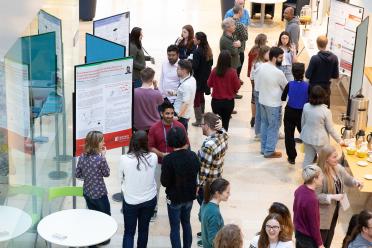
Employed adults spend more time working than doing any other daytime activity. Whether it’s financial stability, a sense of purpose, social connection, or access to workplace support, employers can have an enormous positive influence on wellbeing.
But, for too many people, this potential isn’t being realised.
Dedicated effort to understand the reasons for this, along with initiatives to meaningfully bring about change, are still needed and one of the many reasons why campaigns such as World Mental Health Day exist.

Fortunately, I think we’re seeing a gradual shift towards a more inclusive and accepting sector, thanks both to workplace initiatives to change research culture but also the increased awareness and emotional literacy of today’s scientific workforce.

Dr Dave Wright, Senior Computational Biologist
Dr Dave Wright is a senior computational biologist in the Macaulay Group at the Earlham Institute. He is a trained Mental Health First Aider (MHFA) and sits on the Institute’s Inclusion, Diversity, Equality, and Accessibility (IDEA) Committee as the Mental Health Champion.
“There’s been a steady shift in the general awareness and understanding of mental health and wellbeing in the UK, both in workplaces and in our wider society,” he says.
“At an individual level, this is helping to break old taboos, empower people to talk about their mental health, and to find the support they might need. But, at a societal level, there’s still an opportunity for more workplaces to recognise the huge role they can play.”
The Earlham Institute provides a range of support to its staff and students; a network of trained MHFAs, an employee assistance programme that includes free counselling sessions 24/7, a welfare room in the building, educational talks from expert speakers, awareness-raising events, a range of clubs and societies, and intranet pages with dedicated resources and signposting to external support.
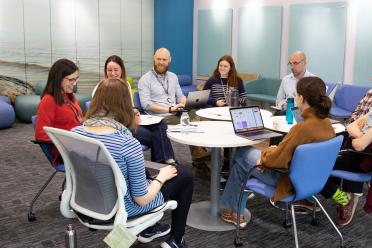
Dr Dave Wright (centre, back) with colleagues at the single-cell journal club.
“We’re on a journey - just like any employer - but the range of support we have available puts us in a great position,” explains Dr Siobhán Dorai-Raj, Inclusion, Diversity, Equality and Accessibility Manager at the Earlham Institute.
“Mental health is consistently raised as one of the main topics the research community wants to see more activity around. That can include training and awareness-raising initiatives, as well as more proactive changes to workplace policies and procedures.
“Through forums like the IDEA Committee, the Institute has clearly-defined ways of proposing new ideas, assigning responsibility for delivering them, and then reporting on their impact.”
The Institute has also been proactive in engaging with other research organisations, which is providing new ways for best practice to be shared across the scientific community.
"One of these is the BBSRC-funded ‘Connecting Research Culture Conference’, which the Earlham Institute is organising and hosting on the 26th-27th March 2025,” says Siobhán.
“There’ll be a dedicated session on ‘Wellbeing and mental health challenges in the research environment’. In the survey we ran to gauge interest in 12 possible session topics, every cohort rated this session highly - with students and postdocs ranking it first and second respectively.”

Mental health is consistently raised as one of the main topics the research community wants to see more activity around. That can include training and awareness-raising initiatives, as well as more proactive changes to workplace policies and procedures.

Dr Siobhán Dorai-Raj, Inclusion, Diversity, Equality and Accessibility Manager
The world of academic research involves a range of sector-specific pressures that can detrimentally affect mental health and wellbeing.
Some are inherent to the structures that enable publicly-funded research, such as reporting pressures and short-term contracts, which can be challenging for a single institute to address. Others may arise from historic perceptions of research career pathways and hierarchy, such as having to move regularly, often between countries and continents, for career progression.
“Fortunately, I think we’re seeing a gradual shift towards a more inclusive and accepting sector, thanks both to workplace initiatives to change research culture but also the increased awareness and emotional literacy of today’s scientific workforce.” says Dave.
Scientific funding bodies are also taking active roles in this change, such as UKRI’s Connected Communities Initiative.
At the same time, there are universally experienced factors affecting our mental health and wellbeing - global social and political unrest, war, climate change, the cost of living, and more.
“Researchers are human beings like anyone else,” says Dave. “Our hearts and minds are just as vulnerable to hardship, loss, worry, or any other difficulty life may throw up.”
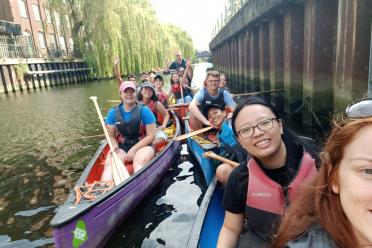
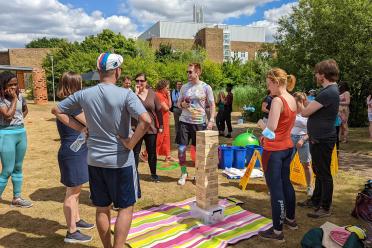
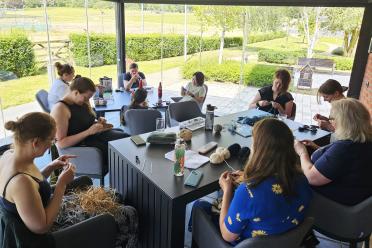

When we feel and believe in the safety provided by our workplace culture, we can be open about the challenges in our lives. It’s only at this point we can really start to benefit from the range of mental health and wellbeing support on offer.

Dr Dave Wright, Senior Computational Biologist
Countering the sometimes overwhelming messages of doom and gloom with inspiration and positivity is something Dave feels workplaces are well placed to champion.
This is particularly true for research organisations, which are often sources of hope for a brighter future by the nature of the work they do in trying to solve societal challenges through science.
“Whether it’s inviting people to craft club, running exercise classes, or simply sharing good news, there’s so much we can do to help ourselves and our colleagues,” explains Dave.
He also believes in the community spirit of workplace cultures, which is something the IDEA Committee and Institute Culture Champions exist to promote.
“Workplaces are communities,” he says. “They provide an opportunity to build cultures that foster a sense of belonging for everyone.
“I think the goal for any community is to create a supportive atmosphere where people feel able to talk, be heard, to speak out, or disagree - and be vulnerable without fear of negative repercussions, a concept known as psychological safety.
“When we feel and believe in the safety provided by our workplace culture, we can be open about the challenges in our lives. It’s only at this point we can really start to benefit from the range of mental health and wellbeing support on offer.”
Talking about our mental health may be difficult at times but it can help us to cope better with life’s ups and downs.
As we approach this year’s World Mental Health Day, there’s no better time to check in with friends, family, and colleagues.